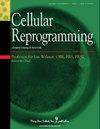Hepatitis B Virus x Protein Increases Cellular OCT3/4 and MYC and Facilitates Cellular Reprogramming.
IF 1.7
4区 医学
Q4 BIOTECHNOLOGY & APPLIED MICROBIOLOGY
引用次数: 0
Abstract
Hepatitis B virus x (HBx) is a multifunctional protein coded by the Hepatitis B virus that is involved in various cellular processes such as proliferation, cell survival/apoptosis, and histone methylation. HBx was reported to be associated with liver "cancer stem cells." The stemness inducing properties of HBx could also facilitate the generation of pluripotent stem cells from somatic cells. It is well established that somatic cells can be reprogrammed to induced pluripotent stem cells (iPSCs) using a cocktail of transcription factors called Yamanaka's factors (YFs) (OCT4, SOX2, KLF4, and MYC). The reprogramming process proceeds step-by-step with reprogramming factor chromatin interactions, transcription, and chromatin states changing during transitions. HBx is a "broad spectrum trans-activator" and therefore could facilitate these transitions. We electroporated low passage and high passage (difficult to reprogram) fibroblasts using YFs with and without HBx and evaluated the reprogramming efficiency. We also investigated the tri-lineage and terminal differentiation potential of iPSC derived using HBx. We found that the addition of HBx to YF improves iPSC derivation, and it increases the efficiency of iPSC generation from "difficult or hard-to-reprogram samples" such as high passage/senescent fibroblasts. Further, we show that HBx can substitute the key transcription factor MYC in the YF cocktail to generate iPSC. The cellular levels of OCT3/4 and MYC were increased in HBx expressing cells. Our results have practical value in improving the efficiency of pluripotent stem cell derivation from "difficult to reprogram" somatic cells, in addition to providing some insights into the mechanisms of liver carcinogenesis in chronic hepatitis B. To conclude, HBx improves the reprogramming efficiency of YFs. HBx increases the cellular levels of OCT3/4 and MYC.乙型肝炎病毒x蛋白增加细胞OCT3/4和MYC,促进细胞重新编程。
乙型肝炎病毒x(HBx)是一种由乙型肝炎病毒编码的多功能蛋白,参与各种细胞过程,如增殖、细胞存活/凋亡和组蛋白甲基化。据报道,HBx与肝脏“癌症干细胞”有关。HBx的干诱导特性也可以促进体细胞产生多能干细胞。众所周知,可以使用称为Yamanaka因子(YFs)的转录因子混合物(OCT4、SOX2、KLF4和MYC)将体细胞重新编程为诱导多能干细胞(iPSC)。重编程过程逐步进行,重编程因子-染色质相互作用、转录和染色质状态在转换过程中发生变化。HBx是一种“广谱反式激活剂”,因此可以促进这些转变。我们使用含有和不含有HBx的YFs对低传代和高传代(难以重新编程)成纤维细胞进行电穿孔,并评估了重新编程的效率。我们还研究了使用HBx衍生的iPSC的三谱系和末端分化潜力。我们发现,在YF中添加HBx可以改善iPSC的衍生,并提高“难以或难以重新编程的样品”(如高传代/衰老成纤维细胞)产生iPSC的效率。此外,我们发现HBx可以取代YF混合物中的关键转录因子MYC来产生iPSC。在表达HBx的细胞中,OCT3/4和MYC的细胞水平增加。除了为慢性乙型肝炎的肝癌发生机制提供一些见解外,我们的研究结果在提高从“难以重新编程”体细胞衍生的多能干细胞的效率方面具有实际价值。总之,HBx提高了YFs的重新编程效率。HBx增加OCT3/4和MYC的细胞水平。
本文章由计算机程序翻译,如有差异,请以英文原文为准。
求助全文
约1分钟内获得全文
求助全文
来源期刊

Cellular reprogramming
CELL & TISSUE ENGINEERING-BIOTECHNOLOGY & APPLIED MICROBIOLOGY
CiteScore
2.50
自引率
6.20%
发文量
37
审稿时长
3 months
期刊介绍:
Cellular Reprogramming is the premier journal dedicated to providing new insights on the etiology, development, and potential treatment of various diseases through reprogramming cellular mechanisms. The Journal delivers information on cutting-edge techniques and the latest high-quality research and discoveries that are transforming biomedical research.
Cellular Reprogramming coverage includes:
Somatic cell nuclear transfer and reprogramming in early embryos
Embryonic stem cells
Nuclear transfer stem cells (stem cells derived from nuclear transfer embryos)
Generation of induced pluripotent stem (iPS) cells and/or potential for cell-based therapies
Epigenetics
Adult stem cells and pluripotency.
 求助内容:
求助内容: 应助结果提醒方式:
应助结果提醒方式:


